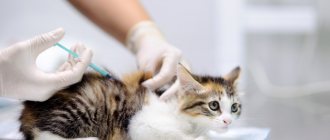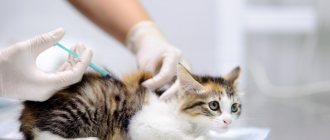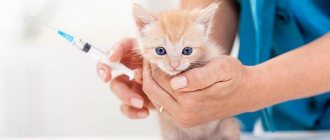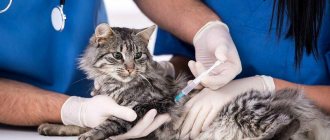Cats are required to receive rabies vaccinations (against rabies), calcivirus infection, panleukopenia and viral rhinotracheitis, and if the animal is involved in breeding, then against chlamydia. Additionally, vaccination is carried out depending on the epidemiological situation in the city. Immunization begins at 8–12 weeks of age and then annually.
The biological products used make it possible to protect the cat’s body from dangerous respiratory diseases, distemper, rabies, chlamydia, and ringworm. The vaccination schedule will be outlined by a veterinarian. Before the procedure, the kitten is treated for worms.
What vaccinations do cats get?
Vaccinations are given to cats for active protection against infectious diseases that are life-threatening to the pet - rabies, panleukopenia, calcivirosis, rhinotracheitis. Currently, drugs have been developed against infections such as chlamydia and infectious peritonitis. You can also protect your furry fidget from ringworm with a vaccine.
Which ones are mandatory and why?
Mandatory immunological treatments include anti-rabies. Immunization against rabies is mandatory due to the fact that the virus is dangerous not only for animals, but also for humans. As a rule, rabies vaccine is administered as part of a polyvalent drug aimed at protecting the body from two or more infections.
Experienced breeders recommend immunizing animals against calcivirus infection, panleukopenia and viral rhinotracheitis . It is these severe infectious diseases that most often lead to death. Animals involved in breeding work must also be protected from chlamydia.
A veterinarian who has an understanding of the epizootic situation in the region will recommend what else to vaccinate your pet against. If there is a high level of trichophytosis in a locality, then care should be taken to protect the cat from this fungal pathology. It would not be a bad idea to vaccinate your cat against ringworm even if there are small children and elderly people in the family.
We recommend reading about the dangers of chlamydia in cats. From the article you will learn about the causes of infection and symptoms of chlamydia, tests for diagnosing the disease, and treatment of chlamydia.
When to do it according to age
The very first treatment should be carried out at 8-12 weeks of age. By this time, the passive protection obtained from colostrum and mother's milk becomes ineffective. At the age of 12 weeks, anti-rabies treatment is carried out. The first immunization is carried out, as a rule, with a complex vaccine and is designed to protect kittens from rhinotracheitis, calcivirosis and panleukopenia.
In some cases, a veterinarian may combine the rabies vaccine with a polyvalent drug. If there are cases of infectious peritonitis in the region, then to protect babies the vaccine is administered at the age of 16 weeks, and a month later revaccination is carried out.
If the area is unfavorable for ringworm, the first vaccination is carried out at the age of 8 weeks, repeated - after 2 weeks.
Many breeders prefer to protect their pets from chlamydia from an early age. Preventive treatment is carried out at the same time as the first vaccination with a complex vaccine - at 9-12 weeks. The vaccination is repeated after 2-4 weeks.
Vaccination rules
To ensure that the immunization procedure does not provoke side effects and complications, it is necessary to follow some rules for the safe vaccination of animals.
Basic rules of the preventive procedure:
- It is not recommended to vaccinate small kittens under 2 months of age.
- The vaccination is performed only by a veterinarian after examining the pet and studying its medical record.
- Vaccinations can only be given to healthy animals. The cat should be alert and active, have a good appetite and normal body temperature. If the examination reveals any symptoms of illness, vaccination is postponed for a certain period until complete recovery.
- To achieve high effectiveness, the cat must be vaccinated again after a certain time interval (re-vaccination).
- The drug to be administered to a pet should be chosen by an experienced veterinarian, based on personal experience and taking into account the individual health status of the cat.
- Before the immunization procedure, the animal must be properly prepared, following the doctor’s recommendations.
Is it possible to inject yourself?
Experienced breeders do not recommend vaccinating themselves, especially regarding rabies. It is no secret that many pets experience a trip to a specialized clinic negatively, and an injection at home, at first glance, is an excellent solution. But in a specialized institution they will not only give the animal an injection, but also conduct a clinical examination, thermometry and make sure that the cat is healthy.
In addition, if a cat suddenly has an allergic reaction, the animal will immediately receive qualified assistance. After the injection, the veterinarian will make a note in the pet’s passport. It will include the processing date, name, series and number of the vaccine. The mark is confirmed by the signature and seal of the institution. Only such a passport will allow the animal to participate in exhibition events and freely cross the borders of the country.
Veterinary passport.
If the cat is very worried, nervous during transportation and in an unfamiliar place, you can use the service of calling a specialist to your home.
Where is it better to get vaccinated at home or in a clinic?
Many people often wonder where it is better to get vaccinated - at home or in a veterinary clinic? Of course, if you have never encountered this procedure, then you should first consider all the pros and cons.
Many veterinarians recommend performing primary vaccinations at home. The fact is that in small animals the immunity is quite weakened, and contact with other sick patients can lead to infection. If the owner is afraid to do this procedure on his own, then many veterinary clinics offer a special service that makes it possible to call a doctor at home.
Calling a veterinarian to your home is a convenient procedure; it has a number of positive aspects:
- eliminates the need to take the animal to the veterinary clinic across the city;
- no need to sit in line for a long time;
- prevents infection of dangerous diseases from other animals that are brought to the clinic;
- Vaccinating a cat at home is much easier and does not cause severe stress in the animal.
But if it is not possible to vaccinate a cat at home, then the primary vaccination can be carried out at a veterinary clinic. You must follow the rules:
- the animal must be transported in a special sterile bag or carrier;
- a clean and sterile cloth or diaper should be placed under the pet;
- preventing contact of a cat with other infected animals in line.
Note! Vaccination in a veterinary clinic has only one advantage - the issuance of a veterinary passport, which will indicate all the vaccinations given. However, currently this service is also provided at home.
Myths and truth about vaccination
The most common myths about vaccinations:
- Domestic cats do not get sick; only purebred pets should be vaccinated against infection. This is wrong. The body of both street and purebred cats is equally susceptible to viral infections.
- If a cat does not go outside, it will not get sick . A pathogenic microorganism can be brought into the room from the outside.
- There is no point in vaccinating a kitten that was not vaccinated at an early age. A veterinarian will prepare a treatment schedule for a pet picked up on the street, and vaccination will help reduce the risk of infection.
- It is expensive. Despite the fact that vaccination has a certain cost, prevention is always cheaper than treatment.
When not to vaccinate
According to the unified veterinary protocol, the first vaccination is canceled if at least one factor from the list is present:
- chronic, acute or subacute disease;
- high temperature - more than 39.2°C degrees;
- exhaustion;
- dehydration;
- suspected immunodeficiency or confirmed diagnosis;
- the animal is less than 8 weeks old;
- recent injection of hyperimmune serum - less than 3 weeks ago;
- helminthiasis or infection with other parasites;
- lack of preliminary deworming;
- recent surgery – less than 2–3 months.
Domestic cats are not vaccinated if they are pregnant. The period of estrus begins at approximately 6–7 months. For some, earlier – from the 5th month. The first vaccination does not affect the health of the kitten if the animal is in heat or on a cat spree. As for the period of change of baby teeth, veterinarians have a mixed opinion.
Important! The main reason for doctors’ refusal to carry out primary vaccination on schedule is the weakened immunity of cats.
Required vaccinations for cats to travel abroad
Necessary vaccinations for cats that are about to travel outside the country include, first of all, treatment against rabies, viral respiratory diseases (calcivirosis, rhinotracheitis), as well as panleukopenia. An important condition for unhindered travel abroad is compliance with the deadlines for anti-epizootic treatments.
Injections must be taken at least 30 days before your departure date. The vaccine is valid for one year.
The cost of vaccination against three infectious diseases and rabies depends on the region. For example, in clinics in the city of Rostov, the cost of the Nobivac Tricat vaccine averages 900 rubles. Adding an anti-rabies drug, for example Nobivac Rabies, to the complex treatment will increase the cost of the service by another 300-400 rubles.
ADVANTAGES AND DISADVANTAGES
| ADVANTAGES of vaccinations | DISADVANTAGES of vaccinations |
| 1. Protection from infectious diseases 2. If the cat scratches/bites someone, you will be relieved of all responsibility (since it is guaranteed not to be sick) 3. A cat or kitten can be freely taken outside the country 4. Opportunity to participate in exhibitions 5. Breeding purebred cats is permitted only if they are vaccinated. 6. In vaccinated mother cats, the offspring are also protected for the first time through the immune system, which strengthens with the resulting milk 7. Vaccinated cats can easily be taken with you to the dacha, on the train, on vacation, and also released into the street 8. Inner peace from this that your beloved pet is protected from infections | 1. After vaccination (less than 1%), side effects are possible. The most common: drowsiness, lethargy, loss of appetite. As a rule, this goes away within a day. Cases of allergy to the vaccine, in which there is swelling of the larynx, muzzle, and paws, are even less likely. May also be accompanied by itching, vomiting, and diarrhea. But such cases are rare. If this happens, you need to contact your veterinarian immediately. 2. The material side of the issue. Vaccinations cost money. Especially high quality ones. |
Vaccinations for kittens
Kittens do not need vaccinations from the first days of life, since when they are born, they are protected from pathogenic viruses and environmental bacteria by antibodies that they receive with their mother’s colostrum. However, passive immunity has a short period and by two months it ceases to cope with its protective function. Immunization comes to the rescue.
At what age are kittens vaccinated for the first time?
Kittens are vaccinated for the first time at the age of 8-12 weeks. As a rule, kittens are treated at 12 weeks if their mother cat has been immunized. If she has not had vaccinations or nothing is known about them, then the vaccine is administered to babies at the age of 8 weeks.
By this time, colostral immunity ceases to protect the animal from infections, so vaccination should not be skipped under any circumstances.
What and when vaccinations are needed according to the vaccination schedule?
The vaccination schedule may look like this:
The owner can obtain a list of required vaccinations for young animals from a veterinarian.
Vaccination against chlamydia, infectious peritonitis, and leukemia is not mandatory, but in areas with an unfavorable epidemiological situation, veterinary experts recommend not to neglect it.
List of mandatory vaccines for British kittens, Scottish Folds, Maine Coons, Bengals and other breeds
The list of mandatory vaccinations for kittens of the popular British, Scottish Fold, Bengal, and Maine Coon breeds is no different from the schedule of ordinary cats.
In veterinary practice, as a rule, a complex vaccine against rhinotracheitis, calcivirus infection and distemper is used. How much preventive treatments cost is influenced not only by the owner’s region of residence, but also by the range of services provided by a veterinary specialist before immunization.
What to do if the vaccination schedule is broken
It happens that the vaccination schedule is greatly disrupted or completely unknown. This happens if a kitten was picked up on the street, but it looks like a home, which can be judged by the presence of a collar, or if the owners simply missed the moment of re-vaccination for their pet. Here you should consult your veterinarian. The doctor will tell you how best to proceed in each specific case. Sometimes a complete repeat of the kitten vaccination schedule is required, and in some situations the doctor can make an individual decision after examining the animal.
Should you vaccinate your cat against toxoplasmosis?
There are no vaccinations against toxoplasmosis for cats, so it will not be possible to get one. The disease has a parasitic etiology and occurs as a result of Toxoplasma gondii entering the cat's body. Infection can only be prevented by excluding raw meat and offal from the diet, not allowing your pet to hunt wild rodents, and cleaning the cat litter daily.
A sick animal poses a danger, first of all, to the embryo located in the womb of a pregnant woman. Unfortunately, a 100% effective vaccine for humans against the protozoan parasite has not been developed in veterinary medicine. To prevent intrauterine infection with toxoplasmosis, women expecting a new addition to the family should minimize contact with kittens and adult animals.
When should you not get the measles, rubella and mumps vaccine?
- If the child has had severe allergic reactions to an aminoglycoside antibiotic in the past.
- Severe immunodeficiency conditions (HIV infection, cancer, blood diseases). However, during the period of remission and under the supervision of the attending physician, such children can be vaccinated.
- The period of pregnancy and breastfeeding.
- Severe reaction to the previous administration of the drug (temperature above 40*C, severe redness and swelling).
- Vaccination is temporarily postponed if the child has an acute infection or an exacerbation of a chronic disease.
Types of vaccines for vaccinating cats by age
Veterinary experts recommend that owners vaccinate cats according to age:
- the first treatment should be carried out at the age of 8-12 weeks against the most dangerous infections - rhinotracheitis, calcivirosis and distemper;
- during revaccination (repeated administration of the drug), which is prescribed, as a rule, after 3-4 weeks, an anti-rabies vaccine is administered;
- In order to maintain the immune system in combat readiness, revaccination against infections is repeated every year.
The scheme from birth to one year is approximately as follows:
Post-vaccination complications
Post-vaccination complications, unlike adverse reactions, are much more complex and can have serious consequences. But they also occur much less frequently - approximately one case per million vaccinations. At the same time, it would not be amiss to recall that similar complications in the case of a disease that the vaccine protects against occur hundreds of times more often.
Causes of complications
There are three main groups of causes of complications after vaccination:
- The reactogenic properties of the vaccine depend on its components, the immune activity of the drug, changes in the properties of the vaccine strain, and contamination of the vaccine. The most reactogenic are DTP and BCG, the most “heavy” drugs are used in vaccines against rubella, mumps, hepatitis B, and polio.
- Features of the body : hidden pathologies that can worsen due to the body’s reaction to the vaccine, the body’s tendency to allergies, autoimmune pathologies, weakened immunity and more.
- Violations of vaccination technique by medical workers, unfortunately, are one of the most common causes of complications after vaccination: incorrect dosage, poor sterilization, incorrect immunization technique or instructions were violated, the wrong solvent was used, the vaccine was incorrectly diluted or not mixed, improper storage, contraindications were not taken into account.
Types of post-vaccination complications
All possible complications after vaccination can be divided into several groups:
- The body's reaction to the vaccine components:
- acute allergies: anaphylactic shock, urticaria, Lyell's and Stevens-Johnson syndromes, Quincke's edema; with timely assistance, as a rule, it does not leave consequences;
- a few hours after vaccination, usually DTP, the child begins to cry loudly and squeal: it’s hard to listen to, but after 3 hours it goes away and does not pose a danger to the baby;
- after 1-3 hours, severe muscle weakness may occur, which quickly goes away.
- Reactions due to poor quality of the vaccine, usually caused by violation of the rules of its storage and transportation:
- the declared immunity is never formed;
- more noticeable local reactions;
- if the sterility of the vaccine is compromised, abscesses, cellulitis or other acute inflammatory changes may occur.
- Post-vaccination complications (PVC) are often associated with violations of vaccine administration technology and violation of asepsis rules: they can lead to purulent-inflammatory diseases. If the BCG vaccine is administered subcutaneously rather than intradermally, a cold abscess develops. When the vaccine is administered into the gluteal muscle instead of the tibial or deltoid muscle, there is a risk of injuring the sciatic nerve or getting inflammation of the subcutaneous fatty tissue. Failure to comply with the rules of asepsis threatens with acute general or local inflammation. And if you inject a vaccine intended for oral administration, pronounced local or general reactions are possible.
- Administration of a vaccine may cause the disease for which it is intended.
- Severe complications can be caused by immunodeficiency in children: meningitis, vaccine-associated polio or encephalitis, BCG osteomyelitis, BCG infection. Fortunately, even with a weakened immune system, such complications are extremely rare. And most importantly: without vaccination, complications after an infection may be more pronounced and have an unfavorable prognosis.
The following describes possible complications after specific vaccinations - all of them are described in detail in the instructions for the drugs for the diseases listed below:
- Hepatitis B rarely causes a temperature above 39 degrees, general reactions (nausea and vomiting, headache, weakness, arthritis), skin rash, optic neuritis and some others.
- DTP vaccine has a high risk of complications and allergic reactions. The most dangerous component of the vaccine is pertussis, which can affect the brain. But the DPT variety, the ADSM vaccine, does not contain a pertussis component, so adverse reactions from it, not to mention complications, are extremely rare. General reactions to DPT - temperature 38-39 degrees, local - pain, redness or thickening, possible severe complications: strong crying of the child, turning into a squeal, temperature up to 40 degrees, vomiting, convulsions, post-vaccination encephalitis, neuritis, polyradiculoneuritis, skin allergic manifestations .
- The only serious consequence of the OPV vaccination against polio is vaccine-associated polio, but it is extremely rare, and even then usually due to a background of immunity deficiency.
- After vaccinations against measles, rubella and mumps, serious complications are very, very rare: thrombocytopenia, pneumonia, one-sided deafness, panencephalitis.
- Possible reactions to the BCG vaccine against tuberculosis :
- local: scar, ulcer, cold abscess, regional lymphadenitis;
- osteitis, lymphadenitis, extremely rarely - allergic vasculitis or lupus erythematosus;
- very rarely, children with T-cell immunodeficiency may develop a generalized BCG infection;
- allergic reactions: rash, erythema nodosum, granuloma annulare, rash, anaphylactic shock, secondary infection.
How are kittens vaccinated?
In veterinary medicine, kittens are vaccinated against pathogenic viruses and bacteria with live and non-live vaccines. Live ones, according to experts, contribute to quick and effective protection against infection, but may be accompanied by complications. Non-live vaccines are extremely rarely accompanied by allergic reactions, but are characterized by a longer period of antibody production.
Vaccinations are also divided into monovalent and complex. Monovalent vaccines protect against one infection, while a complex vaccine includes several types of virus. All biological products are subject to mandatory certification.
For rabies
The following rabies vaccinations are used in veterinary practice:
- Rabikan. A domestic drug with a standard revaccination period of once a year.
- Rabizin is a monovalent rabies vaccine.
- Nobivac Rabies is a popular, high-quality drug from a Dutch manufacturer.
In addition to monovalent vaccines, cats can also be protected from the rabies virus using complex medications. For example, Quadricat not only serves as a preventive measure against rabies, but also prevents infections such as panleukopenia, calcivirosis and viral herpes.
From the plague
The following medications will help protect your pet from panleukopenia:
- Nobivac Tricat Trio. One of the best live vaccines against plague, rhinotracheitis and calcivirus infection.
- Multifel-4. A domestic drug designed to protect your pet from rhinotracheitis, calcivirosis, distemper and chlamydia.
- Feo-O-vax. American analogue of Multifel-4.
- The quadricate also contains a set of panleukopenia pathogen antigens.
From deprivation
The owner can prevent ringworm in a cat by using the following medications:
- Microderm.
- Vakderm.
- Polivak TM (for cats).
The peculiarity of these drugs is that they are used not only for prevention, but also for treating animals from lichen.
From coronavirus
Only one vaccine currently developed and approved for use in the country, Primucell from Pfizer, can protect a pet from coronavirus infection. The American-made drug contains attenuated coronavirus and forms immunity against infectious peritonitis in cats.
How to vaccinate yourself
Vaccination at a veterinary clinic has one significant advantage: obtaining a veterinary passport. If you don't need it, you can vaccinate yourself. This saves you from the need to go to the clinic and pay for veterinarian services, and the cat from unnecessary stress and the danger of catching an infection in the clinic. Recommendations on how to give an injection to a cat are very simple:
- Pay attention to the choice of vaccine. Domestic drugs are much cheaper than imported ones, but animals tolerate them less well. Therefore, it is better to slightly increase the vaccination budget and buy one of the proven drugs: Nobivak, Merial or other foreign-made vaccines. The packaging always indicates which infections the vaccine is effective against. Be sure to inspect the packaging and find out the expiration date of the vaccine;
- For successful vaccination, the animal must be absolutely healthy and eat well. Just as in the case of vaccination in a clinic, before the procedure, the cat needs to be given anthelmintics 10-14 days before the procedure;
- when vaccinating with two drugs, two syringes should be used; insulin syringes with thin needles are best (if the amount of drug administered is less than 1 ml);
- Before the procedure, you should wash your hands, prepare everything you need and do not worry too much - your pet will quickly pick up on the excitement;
- It's easy to give an injection. Draw the drug into the syringe, then release excess air and part of the drug, holding the syringe with the needle up. The remaining vaccine volume must exactly correspond to the recommendations in the drug instructions;
- then secure the cat. It is more convenient if someone else holds the animal, although many cats quite calmly give injections;
- pull up the skin between the shoulder blades and inject into the subcutaneous space;
- The needle must be inserted quite smoothly, without jerking, but quickly. As soon as the needle is in the desired position, the resistance disappears, and you will clearly feel the right moment. The injection itself is not carried out with one press of the piston; introduce the drug gradually;
- Rub the injection site a little.
If the owner is not too nervous, the procedure is quick and almost painless. Therefore, the main thing is to calm down, and only then pick up the syringe.
Most animals tolerate vaccination calmly, but it is necessary to carefully monitor the cat’s behavior after vaccination to exclude the possibility of complications. Warning signs are:
- repeated vomiting and diarrhea;
- very high temperature;
- Lethargy after vaccination is normal. But if the animal refuses to eat and behaves apathetically for more than a day after the procedure, you should consult a doctor.
But most often, vaccination is easy, just provide the animal with a few hours of rest and access to food and water. If the cat is used to walking, it is better not to let it go outside during the first day. Otherwise, the animal will quickly recover from stress and return to its previous lifestyle.
If you are unsure of which vaccinations to get or doubt your ability to get a shot, it is best to contact your veterinarian. A professional doctor will give all the necessary recommendations and carry out the procedure as safely as possible for your pet, providing it with protection from life-threatening and health-threatening infections.
Dead vaccines
- Felovax (Fel-0-Vax) - vaccine against panleukopenia, rhinotracheitis, calicivirus and chlamydia; The vaccine contains inactivated feline panleukopenia virus, two strains of feline calicivirus, inactivated feline rhinotracheitis virus and the causative agent of feline chlamydia (Chlamydia psittaci). Contains thimerosal, neomycin, polymyxin B and amphotericin B as preservatives. Manufacturer Fort Dodge Animal Health, USA.
- Felovax LV-K (Fel-O-Vax Lv-K) is a vaccine against viral leukemia. Manufacturer: Fort Dodge Animal Health, USA.
- Multifel is a vaccine against panleukopenia, rhinotracheitis, calicivirus and chlamydia; The vaccine contains inactivated feline panleukopenia virus, two strains of feline calicivirus, inactivated feline rhinotracheitis virus and the causative agent of feline chlamydia (Chlamydia psittaci). , Russia.
- ChlamyKon is a vaccine against feline chlamydia (strain K-1). Inactivated vaccine. Produced by JSC Vetzverotsentr, Russia.
- Nobivac rabies Vaccine against rabies, contains an inactivated culture of the rabies virus. Manufacturer: Intervet Schering-Plough Animal Health, Netherlands.
- Rabizin - vaccine against rabies; contains an inactivated strain of rabies virus GS-57 WISTAR. Manufacturer: Merial S.A.S. (Merial SAS), France.
- Leukocell 2 (Leukocell 2) Vaccine against viral leukemia; contains inactivated feline leukemia virus (FeLV) and FOCMA antigen. Manufacturer: Pfizer Animal Health, USA.
Live vaccines:
- Leukorifelin is a vaccine against panleukopenia, rhinotracheitis, calicivirosis; contains attenuated feline panleukopenia virus, a solution of the glycoprotein fraction of feline herpesvirus and purified feline calicivirus antigen.
- Quadricat is a vaccine against panleukopenia, rhinotracheitis, calicivirus and rabies; contains attenuated feline panleukopenia virus, a solution of the glycoprotein fraction of feline herpesvirus, purified feline calicivirus antigen and inactivated rabies virus. Manufacturer: Merial S.A.S. (Merial SAS), France.
- Nobivac Tricat - vaccine against panleukopenia, rhinotracheitis, calicivirosis; contains attenuated feline panleukopenia virus (Bristol strain), a solution of the glycoprotein fraction of feline herpesvirus (strain G 2620) and purified feline calicivirus antigen (strain F9). Manufacturer: Intervet Schering-Plough Animal Health, Netherlands.
- Nobivac FORCAT - vaccine against panleukopenia, rhinotracheitis, calicivirus and chlamydia; The vaccine contains inactivated feline panleukopenia virus strain MW-1, feline calicivirus strain F9, feline rhinotracheitis virus strain G 2620A and chlamydia strain Baker. Manufacturer: Intervet Schering-Plough Animal Health, Netherlands.
- Felocell CVR (Felocell CVR) - vaccine against panleukopenia, rhinotracheitis, calicivirosis; contains live attenuated strains of infectious rhinotracheitis virus, calicivirus and feline panleukopenia virus. Manufacturer: Pfizer Animal Health, USA.
- Purevax Manufacturer Merial S.A.S. (Merial SAS), France. Purevax RCP - vaccine against panleukopenia, rhinotracheitis, calicivirosis; contains attenuated feline rhinotracheitis herpesvirus, inactivated feline calicivirus antigens and attenuated feline panleukopenia virus; Purevax RCPCh - vaccine against panleukopenia, rhinotracheitis, calicivirus and chlamydia: contains attenuated feline rhinotracheitis herpesvirus, inactivated feline calicivirus antigens and attenuated feline panleukopenia virus, as well as attenuated feline chlamydophila (the causative agent of feline chlamydia).
- Purevax FeLV - vaccine against viral leukemia; contains a recombinant canarypox virus in the genome of which the FeLV gene is expressed using genetic engineering. Manufacturer: Merial S.A.S. (Merial SAS), France.
- Primucell FIP - vaccine against infectious peritonitis: contains attenuated coronavirus. The vaccine is administered through the nose. First used in 1990. Manufacturer: Pfizer Animal Health, USA.
- Katavac Chlamydia is a vaccine against feline chlamydia. Manufacturer: Fort Dodge Animal Health, USA.
All companies that produce these drugs recommend revaccination with the same drug as the primary vaccination.
The effectiveness of vaccination can be significantly reduced due to the use of immunoglobulins, sulfonamides and antibiotics a few days before the vaccine is administered and a month and a half after.
Special conditions are required for transportation and storage of vaccines. Vaccination with a spoiled vaccine can cause severe illness and even death of the animal. Therefore, vaccines should never be dropped from hands or on the market.
Vaccinations completed are recorded in the veterinary passport. This passport is necessary for participation in exhibitions, when traveling abroad, as well as for proper vaccination throughout the life of the animal.
Vaccines for the treatment and prevention of lichen (trichophytosis and microsporia):
Microderm, Polivac TM for cats, Vakderm - F for cats.
These vaccines create immunity of short duration (2-3 weeks). In addition, there is a high probability that a healthy animal will get shingles after vaccination - the vaccines are live. It should also be kept in mind that shingles is not fatal. It is easily treated and can be avoided by following basic hygiene and pet care rules. Therefore, these vaccines are used mainly for TREATMENT, not PREVENTION, of lichen.
What vaccinations do cats get once a year all the time?
After the first treatment and revaccination have been carried out, all vaccinations are given to the cat, as a rule, once a year. The exception is the Nobivak Rabies rabies vaccine, which is repeated every two years.
Preparing a cat before vaccination
According to veterinary experts, proper preparation of a cat before vaccination is the key to the formation of stable and long-term immunity, and first of all, the animal needs to be treated against parasites.
The need for deworming and anthelmintic drugs
Deworming your pet before administering the vaccine is mandatory. This is due to the fact that parasites (including external ones) secrete toxins that can distort the body’s immune response to the introduction of a weakened virus, which will lead to weak protection against infection.
As a rule, 10-14 days before the proposed vaccination, the animal is given an anthelmintic drug, for example, Pyrantel, Kanikquantel, Drontal, etc. A veterinarian will help you choose an antiparasitic drug and calculate the dose.
Is it possible to feed the animal
You can feed your cat before the injection, but only if the animal tolerates the trip to the clinic. If the cat is worried or nervous, then you should not give him food before visiting the doctor. After the injection, you can give your pet water and some of his favorite food.
Key requirements for immunization
When immunizing a kitten, you should follow some rules:
- the drug can only be administered to a completely healthy pet;
- Injections are prohibited for a kitten after communicating with infected relatives;
- after immunization, surgical intervention is contraindicated for 21-25 days;
- after surgery, vaccination is not carried out for at least 21 days;
- if antibiotics are used for therapy, administration of the medication is allowed after 2 weeks;
- It is forbidden to vaccinate your pet when changing teeth;
- the vaccine should not be expired;
- It is contraindicated to vaccinate pets under 2 months of age;
- During the procedure, the baby must be calm.
Complications after vaccination in cats
In veterinary practice, complications after vaccination in cats are rarely observed, but some individuals may experience an allergic reaction or develop a mild form of the disease, especially when using live vaccines.
Is it necessary to quarantine to avoid negative consequences?
In the event that an adult animal was picked up from the street and vaccinated, experienced breeders recommend quarantine measures to the owners. The fact is that a cat’s immunity develops gradually, and it can be a source of infection for other pets living in the same area. As a rule, the new resident is isolated for 10-14 days after vaccination, and then the quarantine can be lifted.
What to do after vaccination
For 10 days after vaccination, you should quarantine, that is, exclude the cat from walking outside and any contact with animals. The pet should be protected from stress and hypothermia should be avoided. Particular attention should be paid to the proper nutrition of the cat. The diet should be balanced and complete.
If a cat experiences side effects after vaccination, it should be shown to a veterinarian. The doctor will conduct an examination, determine the cause of the symptoms, select a treatment course and decide on a further vaccination schedule. It may be necessary to revaccinate with a different vaccine.









